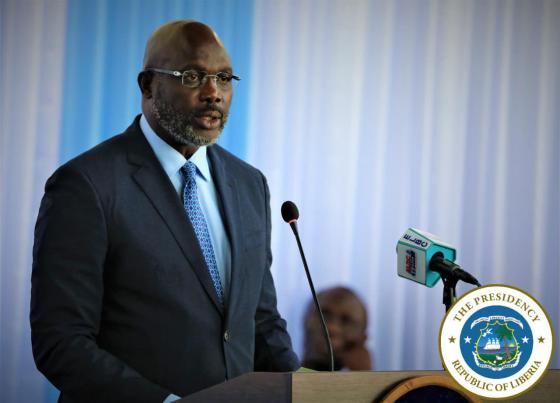Liberia: Pres. Weah Backs ECOWAS’s Military Intervention in Niger

….But it remains unclear whether Liberia will send forces for the mission
President George Weah has backed ECOWAS’s plan for a military intervention in Niger to help restore ousted President Mohamed Bazoum.
The President’s decision at an Extraordinary ECOWAS Summit was disclosed by Foreign Affairs Minister Dee-Maxwell Kemayah. It comes just as Nigeria, Senegal, Côte d'Ivoire, and Benin have committed to providing soldiers for the mission.
Kemayah noted that the Weah administration strongly condemned the Nigerien junta’s actions, including its refusal to cooperate with diplomatic efforts to restore the Bazoum outsted government.
“As the leader of a post-conflict State in which many diplomatic and military interventions took place to resolve the Liberian conflict, President Weah has directed that I declare Liberia’s strong support for the measures announced by the ECOWAS,” Kemayah said.
“[We] wish to make it unequivocally clear, that [we] strongly oppose any act of unconstitutional change of government, while reiterating its zero tolerance to all forms of undemocratic means of ascending to power,” he added.
At the Summit, ECOWAS Heads of State and Governments ordered the bloc military chiefs to immediately activate and deploy a regional standby force to restore constitutional order in Niger. The order comes as Nigerien President Bazoum remains detained by members of his Presidential Guard who overthrew him on July 26, making the country one of the few in the region whose governments have been toppled by its military since 2020.
Weah has, however, not disclosed whether or not the Liberian military personally will be part of ECOWAS military operations.
According to Omar Alieu Touray, the President of the ECOWAS Commission, all diplomatic efforts made in resolving the crisis have been definitely repelled by the military leadership, leaving little or no options outside of military interventions.
“[ECOWAS] directs the Committee of Chiefs of Defence Staff to immediately activate the ECOWAS Standby Force with all its elements; and order the deployment of the ECOWAS Standby Force to restore constitutional order in the Republic of Niger,” Touray said.
Touray also warned of consequences for member states whose actions directly or indirectly oppose the peaceful resolution of the conflict. He also reiterated the body’s strong condemnation of the coup d’état and the continued illegal detention of Bazoum, his family, and members of his government.
Since the July 26 overthrow of Niger’s democratic leadership, the coup plotters have refused to relinquish power and release detained Bazoum, ignoring an August 6 deadline from ECOWAS to reinstate him.
The meeting in Abuja began hours after Niger’s coup leaders appointed a new interim government. Mahamane Roufai Laouali, cited as “secretary general of the government”, named 21 ministers without specifying any further government plans.
ECOWAS defense chiefs last week drew up plans for possible military intervention in Niger, which the heads of state discussed during Thursday’s summit. The summit communique gave no indication of when or under what circumstances a deployment within Niger might take place.
“No option is taken off the table, including the use of force as a last resort,” said Nigeria’s President Bola Tinubu, the ECOWAS chair, at the end of the summit.
“We remain steadfast in our commitment to supporting Niger in the journey towards peaceful democratic stability,” he said.
“I hope that through our collective effort, we can bring about a peaceful resolution as a roadmap to restoring stability and democracy in Niger. All is not lost yet.”
ECOWAS also said it would enforce all measures, in particular, “border closures, travel bans, and assets freeze, on all persons or groups of individuals whose actions hinder all peace efforts in ensuring the smooth and complete restoration of constitutional order.”
The bloc plans military intervention within its rights and safeguarding the stability of the bloc and the protocol on democracy and good governance, which emphasizes the importance of the peaceful transfer of power.
The Protocol adopted by ECOWAS in 2001 stands as the bloc’s commitment to democratic principles and explicitly recognizes the right of ECOWAS to intervene in member states in exceptional circumstances where democracy is under threat.
Article 1 of the protocol, among other things, boldly states that ECOWAS has “Zero tolerance for power obtained or maintained by unconstitutional means and strict adherence to democratic principles.”
International law also support ECOWAS’s right to intervene militarily in the face of threats to security. Chapter VIII of the United Nations Charter explicitly provides for regional organizations to take collective action to address regional conflicts.
Meanwhile, putschists in Mali and Burkina Faso have expressed support for Niger's junta and warned that any military intervention from ECOWAS would be seen as a declaration of war. Guinea has also said it backs Niger.
Editor's Note: The previous version of this story was lacking a quotation from the Liberian Minister of Foreign Affairs, as the statement was initially unavailable. Nevertheless, Minister Kemayah has since provided a statement on the matter, which is now included in the article.
